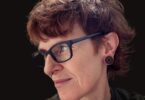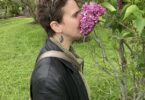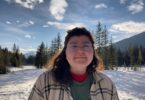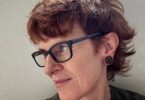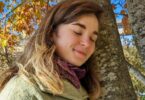Sydni Zastre
We land Saturday around two and it is warm, but the pilot warns us to expect heavy wind in Málaga, coming down from the mountains. The Norwegian boys next to me have been talking since we left Gatwick, while I slept fitfully and read Tipping the Velvet, and they keep talking as I stare out the window for the whole twenty minutes they keep us on the tarmac. I wonder what they think of me, who they think I am. We are probably the same age—nineteen, early twenties—but I know I look older in my tweed coat. I don’t think I smiled for the whole flight.
My grandparents meet me at the arrivals gate in their matching windbreakers, their watermelon coats—pink for her, green for him. There was one agent working the customs desk, under the EU Passports sign. I worried there would be a problem, dreaded the consequences more for reasons of making a scene than being denied entry, but he took my Canadian passport, smiled, stamped it, told me, “Welcome,” and I walked all the way through the baggage claim, nothing to collect.
I wave to my grandparents and find myself grinning as I cross the floor to them, push my way through the turnstiles. My grandfather pulls out his phone and takes a picture of me and my grandmother to send to my mom. I look tired.
“Are you hungry?”
“Yeah, very.” I haven’t eaten since the too-buttery sea-salted airport pretzel this morning.
“We can go into the pueblo, or down the paseo, or there’s food at home. We made pasta and meatballs this morning.”
I am starving and tired, have been up since 5:30, travelling since seven. I need to eat and pee and take a nap. “Home sounds great.”
Between the lift and the car my sense of disquiet finds a cause. I learn that a friend of my aunt’s—the aunt who moved to Spain at nineteen, the reason we all come here now—had died unexpectedly while skiing in the Sierra Nevada the day before. His name was Mike Barber; he had had a massive heart attack. (That phrase sticks with me as being particularly awful; it keeps being repeated and haunts me every time. I imagine it being said about my own father one day down the line.)
Mike was, my grandmother says, with his partner Tim when he died, but his wife and kids have flown in from Paris. In fact, they had seen them—eight or nine people, all weeping—while they waited for me. From this I gather that Mike and his wife had split up and now he was living with Tim, his lover. I will only be disabused of this notion tomorrow, when I ask, and learn that Tim was his business partner. Nothing more sordid or ordinary than that.
At home we have pasta as promised, and a frothy pink dessert prepared in the Jetsonian German kitchen apparatus called the Thermomix that my grandparents have been raving about since Christmas. The dessert tastes like a strawberry Orange Julius; I have seconds even though I’m full. I don’t eat enough in England.
The wind picks up again after lunch; it’s February and it won’t warm up until April. When we were here at Christmas it was freezing: we stayed at the finca and slept under layers and layers with the fireplaces burning smoky and hot, and still my bones ached for two days. Nadia’s Greek mother fussed over me and called me “precious” and told me I looked so pale. I liked being an invalid. I smiled half-heartedly and shrugged. What can you do?
In a few months I will be diagnosed with a chronic illness. When I start getting better, I will miss being as sick as I was.
At the department store, my back hurts, and I lean on shelves and bend my knees and surreptitiously pull out my phone to exchange sweetnesses with my girlfriend, Willow, as my grandparents pick out silicone discs to move furniture with. They just got possession of their apartment in the hills.
They practice their Spanish on the obliging cashier. I gaze at the little boys’ sailor suits and feel my usual longing for a son who adores me. I would name him George, or Wilfred, or Laurie, something gentle and old-fashioned like that. He would love me with a gentle, old-fashioned love, like First World War soldiers writing home.
After an hour or two at home, we go out for supper and meet Cris and Nadia and their son at the restaurant. Cris is my mother’s half-Spanish cousin; Nadia is his wife and my favourite person in the world. She is Palestinian and Greek, and grew up all over the world, and met Cris at MIT; her English is American with the occasional charming British lilt. Oh-some, she says for “awesome,” and I catch myself saying it sometimes after we come home.
She is wearing the long, straight, beautiful patterned coat I so admired at Christmas: a dark-navy foreground with chips of orange, turquoise, green. She hugs me and kisses my cheeks and says, “I could get used to this”—my being here, if only for the weekend—and I feel the same way I would have, had a lover said the same thing. She wants to sit with me at dinner.
When we leave, everyone else thinks it is chilly. I am exhausted and the cold air wakes me. It’s too hot in the apartment when we get home, but I take a bath anyway. When I get out, I wrap myself in a big white Ikea towel. My hair is tied up atop my head and my eyes look bright and charming behind my glasses. My skin glows softly. I take a picture and send it to Willow. She tells me she loves me.
In just under two weeks, the germ of co-dependency lying dormant in our relationship will begin to wake and mutate into the emotional abuse that will end it. I will leave her in April, leave England in June, and the name of her street will make me sick for a year.
I put on my pyjamas. I work a little on my novel, I journal, I go to bed. It’s too silent, I can’t sleep right away; the wind has quieted again. We talked too much about death today.
The next morning we dress in red-and-white gear and watch half a field-hockey match between Canada and Spain. At half-time, my aunt drives my grandmother and me to her daughter Cler’s house. Cler—who has strong features and thick dark hair, a musical voice and a handsome throaty laugh—makes us tea and offers us snacks, and then leaves us to watch the baby while she goes to the viewing of Mike’s body.
Auntie Cathy and my grandmother start talking of growing old, of people they know who are dead or are dying. There is a tightness in the pit of my throat. I text Willow one-handed to share my unease. “It all happened so suddenly,” my grandmother says of Mike. “It would have been a blessing if the last stroke had killed him,” Cathy says of their own father.
I learn that, when I was little and my father was trying to stop smoking, my grandmother found him in one of the trucks at the office, crying into his hands.
My grandfather and Cler’s son arrive from the field-hockey match. Spain won, Leo tells us, four-one. No one had expected Canada to do well, but out of necessity we all cheered for both sides. Cler comes home, and Cathy gets up to leave and take her place at the wake, which is not really called a wake, but has a Spanish name I can’t remember.
It’s cold in the house. We light Cler’s gas heater and the flame flares to life, startling me: I had not known they kept fire like this. Earlier, she hung the washing outside; the scent of soap wafted in, fresh and strong. It was warmer on the terrace than inside.
The baby wakes up when it’s time for us to leave. We are going to a birthday party at somebody’s finca in Marbella for a woman only two of us have met. This is usual for our trips here: we are forever being ferried off to the houses of friends of friends, business contacts, distant cousins of Cathy’s boyfriend’s son. It is all very Bohemian to me, all these people with new-bourgeois jobs in events or tech or advertising, who speak accented English and split their time between Málaga and Tehran and L.A., or Stockholm and New York and Dubai.
Cler offers us snacks again; I accept two mandarin oranges, which she calls mandaríns. We wait outside for my grandfather to pull the car up. The reddish baked bricks of the sidewalk are spattered with wet. I peel my orange and realize it’s hailing.
“Hail,” I say. I never talk enough on these trips.
“No, it’s just hard rain,” says my grandmother. We watch a blonde woman come out the other gate, struggling to fit a green umbrella through sideways. She smiles sympathetically at us as she and her son hurry to their car.
“No, it’s hail,” I say. “Pellets.” There is orange peel under my nail. I dig in my purse for a napkin as if I’ve done something wrong.
“Oh, you’re right. Strange weather,” my grandmother says. We stand looking out at it. The orange in my hands sends up its sweet sharp scent.
In the car, I peel the second one, laborious and messy. Juice leaks all over my hands and the napkin in my lap, and I have to pick out four or five seeds. I already know I will write all this when I finish eating it. On WhatsApp, Willow is telling me she wants to bake bread today, and I am picturing her with her red curls tied back and flour on her nose. I get to see her on Tuesday.
We drive up to the highway, or maybe it’s the coast road. The sun was out briefly but it’s cloudy again. Cler catches up with us at the service station and we follow her little red car to Marbella.
On the way back from the party, later, it will start to pour along this road. The sky will have darkened without my noticing: I will have dozed most of the way, and my neck will hurt from the way my body falls and jerks in sleep. The loud angry roar of the rain will be interrupted with sharp silence each time we pass under a bridge.
The party will have been a lively Persian affair. I will exchange a few words in German with someone’s father and then spend the next few hours ensconced on the couch, silent in front of the fire with chatter all around me, until Cler’s greying young friend Paulo asks me if I am a friend of the family. We will talk about London, where he used to live. We will talk about the novel I am writing. He will ask me questions, seem engaged; I will like him, but will still want to be somewhere else. I love these gatherings but always want to leave them.
But we are still driving there. None of this has happened yet. Mike Barber is still dead. My grandmother tells my grandfather everything we did while he was at the match: “We talked about you,” she says. “About your time in Scotland, and the mail run. Syd figured out you were born during the Blitz. We talked about quitting smoking.”
“Oh, right,” he says, and my grandmother chatters on. They are talking again about death.
“It was really quite warm when the sun came out,” my grandfather says. “It didn’t last very long.”
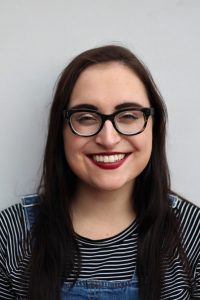 Sydni Zastre will graduate with a BA Hons in History and German from the University of Alberta in the spring of 2020. She plans to begin her MA in Queer History at Goldsmiths, University of London in September 2020. Her first play, Paris, Without Return, was produced in February 2020.
Sydni Zastre will graduate with a BA Hons in History and German from the University of Alberta in the spring of 2020. She plans to begin her MA in Queer History at Goldsmiths, University of London in September 2020. Her first play, Paris, Without Return, was produced in February 2020.


